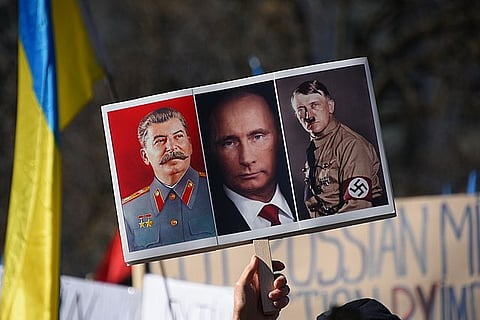Russian President Vladimir Putin has introduced martial law in four of Ukraine's regions, parts of which are under the control of Russian troops, as Ukrainian forces continue liberating occupied territories in the country's east despite another barrage of air attacks across the country.
Putin said at an online session of the Security Council on October 19 that he signed a decree declaring martial law in Ukraine's Donetsk, Luhansk, Kherson, and Zaporizhzhya -- all of which Russia illegally annexed last month.
He didn’t immediately describe the steps that would be taken under martial law but said his order was effective starting at midnight on October 20. His decree gives law enforcement agencies three days to submit specific proposals.
The package of moves, which come nearly eight months into the war launched by the Kremlin in late February, marked the latest escalation by Putin to counter a series of defeats to Ukrainian forces since the start of September.
By extending the decree to regions beyond Ukraine, the move ensures that more Russians, already angered by a military mobilization announced last month, will more deeply feel the consequences of the war in their own lives.
Mykhaylo Podolyak, an adviser to the Ukrainian presidential office's head, called Putin's move "a pseudo-legalization of looting of Ukrainians' property."
"This does not change anything for Ukraine: We continue the liberation and deoccupation of our territories," Podolyak tweeted shortly after Putin announced martial law in the four Ukrainian regions.
U.S. President Joe Biden, speaking at the White House, said Putin is trying to get Ukraine to give up.
"I think that Vladimir Putin finds himself in an incredible difficult position and what it reflects to me is it seems his only tool available to him is to brutalize the individual citizens in Ukraine…to try to intimidate them into capitulating. They are not going to do that," Biden said.
U.S. State Department deputy spokesman Vedant Patel said earlier the declaration of martial law was a desperate tactic and any claim by Russia over the regions was "illegitimate."
Putin's move came as the Russia-installed leader of Ukraine's southern Kherson region said the evacuation has started of tens of thousands of civilians and Moscow-appointed officials in the face of a Ukrainian military advance.


